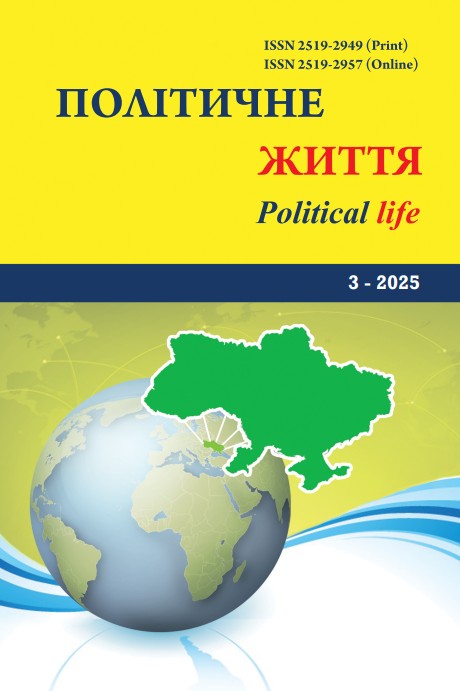Теоретико-методологічні підходи до дослідження Арктики як простору геополітичного суперництва
DOI:
https://doi.org/10.31558/2519-2949.2025.3.19Ключові слова:
Арктика, геополітичне суперництво, теорія геополітики, методологія, безпека, міжнародні відносиниАнотація
Арктика дедалі частіше фігурує як простір інтенсивної геополітичної взаємодії, що супроводжується зростанням інтересу з боку провідних держав і транснаціональних акторів. Якщо впродовж тривалого історичного періоду регіон сприймався як периферійна, малодоступна й маргіналізована зона, то у ХХІ столітті він дедалі чіткіше окреслюється як стратегічний простір, у якому переплітаються інтереси у сферах безпеки, природних ресурсів, транспорту, екології та міжнародного символічного престижу. Потепління клімату та танення льодовиків сприяли відкриттю нових судноплавних маршрутів, уможливили доступ до раніше недоступних енергетичних ресурсів, а також привели до загострення конкуренції за політичний контроль над окремими арктичними зонами. Арктика стає ареною, де конфігурація глобальних і регіональних сил не лише відображається, але й активно формується. У цьому контексті зростає наукова потреба у виробленні концептуального та методологічного підґрунтя для адекватного аналізу динаміки арктичного суперництва. Наявні дослідження демонструють фрагментарність і теоретичну розпорошеність, що ускладнює формування цілісного наукового підходу. Саме тому метою даної статті є систематизація ключових теоретико-методологічних підходів до аналізу Арктики як простору геополітичного суперництва та оцінка їхньої евристичної спроможності в умовах сучасної трансформації міжнародної безпекової архітектури. Дослідження ґрунтується на міжпарадигмальному підході, який поєднує положення класичної геополітики, неореалізму, геоекономіки та критичної геополітики. Кожна з цих парадигм має свою пояснювальну логіку, пропонує специфічний інструментарій та фокусує увагу на різних акторах, мотиваціях і рівнях аналізу. Так, класична геополітика зосереджується на просторовому контролі, неореалізм — на балансі сил та конфліктогенності середовища, геоекономіка — на конкурентному доступі до ресурсів і логістиці, а критична геополітика — на дискурсивних репрезентаціях і ідеологічних наративах. У роботі розглянуто, як ці підходи інтерпретують політичну природу арктичного простору, визначають типи акторів та логіку їхньої поведінки, а також дають змогу описати багаторівневі прояви суперництва в регіоні — від прямих територіальних претензій до символічної боротьби за право визначати порядок денний. Окрема увага приділена методологічним викликам, що виникають під час аналізу арктичної тематики: йдеться про гібридність просторової структури регіону, правову невизначеність юрисдикцій, обмежений доступ до стратегічної інформації, деградацію багатосторонніх інституцій співпраці, а також специфіку дискурсивного конструювання Арктики як «особливого» геополітичного простору з міфологізованим статусом «глобального заповідника» чи «форпосту майбутнього». У результаті дослідження сформульовано аналітичну рамку, що враховує міждисциплінарний характер арктичного виміру, його динамічність, поліцентричну структуру та зростаючу роль у конфігурації нового глобального порядку.
Посилання
Bjerke M., Smith S. (2020). China’s Polar Silk Road and the Arctic Geoeconomics. Oslo : NUPI, 32.
Brosnan I., Leschine T. M., Miles E. L. (2011). Cooperation or Conflict in a Changing Arctic? Ocean Development & International Law, 42 (1), 173–210.
Byers M. (2019). Cold, Dark, and Dangerous: International Cooperation in the Arctic and Space. Polar Record, 55 (1), 32–41.
Byers M. (2010). Who Owns the Arctic? Understanding Sovereignty Disputes in the North. Vancouver : Douglas & McIntyre, 224.
Chater A. (2021). Explaining China’s Arctic Engagement: Between International Norms and Domestic Drivers. The Polar Journal, 11 (1), 59–80.
Cohen S. B. (2009). Geopolitics: The Geography of International Relations. 2nd ed. Lanham : Rowman & Littlefield, 504.
Conley H., Melino M. (2020). The Ice Curtain: Russia’s Arctic Military Presence. Washington, D.C. : Center for Strategic and International Studies (CSIS), URL: https://www.csis.org/analysis/ice-curtain-russias-arctic-military-presence
Conley H., Roberts L., Saeed S., Melino M. (2020). America’s Arctic Moment: Great Power Competition in the Arctic to 2050. Washington, D.C. : Center for Strategic and International Studies (CSIS), 44.
Dalby S. (2008). Writing Critical Geopolitics: Campbell, Ó Tuathail, Reynolds and the Decolonization of Political Geography. Political Geography, 27 (3), 280–288.
Dittmer J., Dodds K., Ingram A., Moisio S. (2011). Have You Heard the One About the Disappearing Ice? Recasting Arctic Geopolitics. Political Geography, 30 (4), 202–214.
Dodds K. (2019). Geopolitics and the Changing Arctic. Lanham : Rowman & Littlefield, 240.
Ebinger C. K., Zambetakis E. (2009). The Geopolitics of Arctic Melt. International Affairs, 85 (6), 1215–1232.
Heininen L. (2016). Arctic Geopolitics from Classical Theories to Critical Geopolitics. In: Heininen L. (ed.) Future Security of the Global Arctic: State Policy, Economic Security and Climate. London : Palgrave Macmillan, 13–42.
Luttwak E. (1990). From Geopolitics to Geo-Economics: Logic of Conflict, Grammar of Commerce. The National Interest, 20, 17–23.
Mackinder H. J. (1904). The Geographical Pivot of History. The Geographical Journal. 23 (4), 421–437.
Rahbek-Clemmensen J. (2023). The Arctic Turn: The Rise and Fall of Arctic Multilateralism. Orbis, 67 (2), 294–310.
Steinberg P. E., Tasch J., Gerhardt H. (2015). Contestations of Space in the Arctic: Indigenous Rights, Resource Development, and Climate Change. Annals of the Association of American Geographers. 105 (2), 292–301.
US Geological Survey. (2008). Circum-Arctic Resource Appraisal: Estimates of Undiscovered Oil and Gas North of the Arctic Circle. Washington, D.C.. URL: https://pubs.usgs.gov/fs/2008/3049/ (дата звернення: 15.06.2025).
Young O. R. (2016). Arctic Governance: Pathways to the Future. Arctic Review on Law and Politics. 7(2), 164–185.

